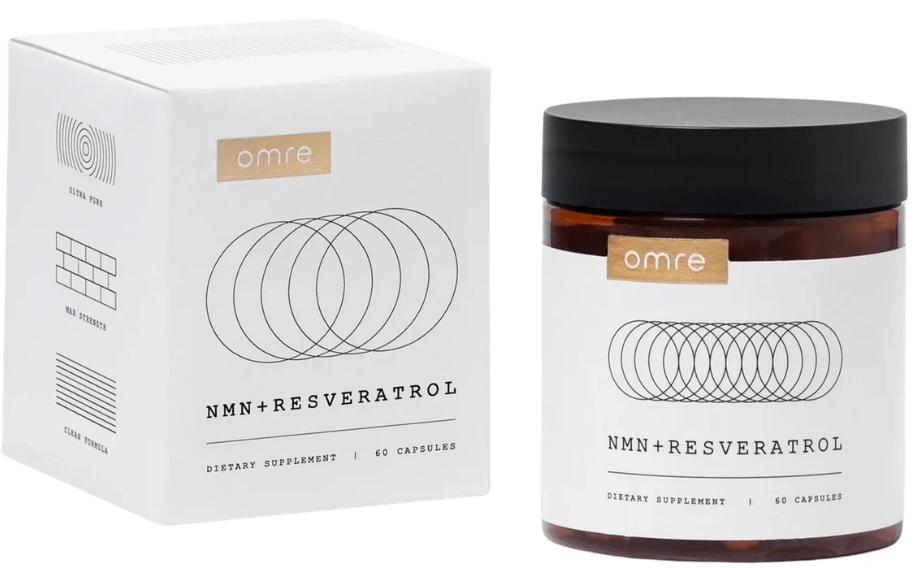Table of Contents
If you’re looking to support healthy aging or improve your cellular energy, increasing NAD levels naturally may help. NAD plays a major role in how your body makes energy, repairs itself, and handles stress.
And the good news is, there are several science-backed ways to support your NAD levels, without injections or expensive treatments.
NMN + RESVERATROL
Cellular NAD+ booster with ultra‑pure NMN and Resveratrol, at research‑backed doses.*
TL;DR
You can increase NAD levels naturally with simple changes like fasting, exercise, circadian syncing, and cutting alcohol. These approaches activate your body’s own NAD-recycling pathways, no injections or extreme measures needed.
What is NAD?
NAD is a coenzyme found in every cell that helps convert nutrients into energy. It stands for nicotinamide adenine dinucleotide, and it exists in two forms: NAD+ and NADH.
Your body naturally produces NAD, but levels decline as you age. This drop is linked to fatigue, slower cell repair, and signs of aging.
Scientists have been studying ways to maintain or raise NAD levels in hopes of promoting healthier aging and longer healthspan.
Although most studies have been done in animals, early findings are promising. Supporting NAD through diet, movement, sleep, and supplements is considered a low-risk strategy with potential benefits.
What Does NAD Do in the Body?
 NAD supports metabolism, DNA repair, and cellular defense. It acts like a helper molecule that powers key biological processes.
NAD supports metabolism, DNA repair, and cellular defense. It acts like a helper molecule that powers key biological processes.
Think of NAD as your cell’s fuel assistant. It helps enzymes do their jobs, especially the sirtuins, which are known for their role in aging and inflammation control. NAD is also required for repairing damaged DNA, managing stress responses, and maintaining your circadian rhythm.
Without enough NAD, these systems can start to break down. That’s why researchers are exploring ways to restore NAD levels, especially as we get older.
How to Increase NAD Naturally
-v1752278098400.webp) You can increase NAD levels naturally through fasting, exercise, sleep, diet, and smart lifestyle habits. These approaches activate your body's internal NAD recycling systems and may help maintain healthy levels as you age.
You can increase NAD levels naturally through fasting, exercise, sleep, diet, and smart lifestyle habits. These approaches activate your body's internal NAD recycling systems and may help maintain healthy levels as you age.
Here’s a closer look at research-supported methods:
1. Fasting
Fasting activates enzymes that boost NAD through a process called the salvage pathway.
When you fast, your body switches from burning food to repairing itself. Studies have found that caloric restriction increases NAD+ levels in tissues and enhances sirtuin activity in mice (1).
Even intermittent fasting, like the 16:8 method, may help. This involves fasting for 16 hours and eating within an 8-hour window. It's best to ease into this and check with your doctor, especially if you have health conditions.
2. Exercise
Exercise stimulates genes that promote NAD production and use.
High-intensity interval training (HIIT) in particular appears to raise NAD levels in skeletal muscle, based on findings in both humans and rodents (2). But any consistent movement helps.
Exercise also improves mitochondrial function, which is where NAD does a lot of its work. Aim for regular aerobic or resistance workouts that get your heart rate up, even if it's just brisk walking.
3. Sleep and Circadian Rhythm
Good sleep supports NAD production by syncing with your body’s internal clock.
Your NAD levels follow a 24-hour cycle, just like your sleep-wake rhythm. Poor sleep can disrupt this, leading to a drop in NAD and reduced sirtuin activity (3).
Aim for 7–9 hours of sleep in a dark, cool environment. Try to wake up and go to bed at consistent times. Morning sunlight also helps reset your circadian rhythm, which can indirectly support NAD function.
4. Diet
Some foods contain NAD precursors like NMN and NR, which your body can convert into NAD.
Vegetables such as broccoli, edamame, and cabbage contain small amounts of NMN. For example, broccoli has 0.25–1.88 mg of NMN per 100 grams (4).
On the flip side, high-fat and high-protein diets may reduce NAD availability. Excess fuel from rich diets can shift your metabolism away from NAD-boosting repair pathways.
NMN + RESVERATROL
Cellular NAD+ booster with ultra‑pure NMN and Resveratrol, at research‑backed doses.*
5. Sauna and Cold Exposure
Heat and cold stress may stimulate NAD production through mild hormesis.
Hormesis is a term that means “beneficial stress.” Research suggests that exposing cells to short bursts of cold or heat may increase the NAD+/NADH ratio (5)
That’s why practices like sauna sessions and ice baths are gaining attention in longevity circles. While human studies are still early, these methods appear to trigger repair mechanisms linked to NAD.
6. Morning Sunlight
Natural sunlight in the morning helps regulate circadian rhythm, which supports healthy NAD levels.
Light exposure, especially within the first hour of waking, signals your body to reset its clock. This rhythm controls key enzymes that help recycle NAD.
Try getting 10–15 minutes of sun on your face and arms each morning. It can also improve sleep quality, which loops back to supporting NAD.
7. Limit Alcohol Intake
Cutting back on alcohol preserves NAD because alcohol metabolism consumes NAD rapidly.
When you drink, your body uses NAD to break down alcohol. Frequent drinking can lead to NAD depletion, which interferes with cell repair and energy production (6).
Even reducing intake a few days a week can make a difference. Swapping alcohol for herbal tea or sparkling water is a simple change with cellular benefits.
Supplements That Support NAD Naturally
NAD precursors like NMN (Nicotinamide Mononucleotide) and NR (Nicotinamide Riboside) are among the most researched ways to support NAD levels.
These compounds act as building blocks your body uses to make NAD, especially as natural production slows with age.
Studies in animals have shown that NMN and NR supplementation can raise NAD+ levels, improve insulin sensitivity, and enhance mitochondrial function (7).
Resveratrol is another compound often paired with NMN or NR. While it’s not a direct NAD precursor, it activates sirtuins, enzymes that depend on NAD to function.
Together, these ingredients support both the supply and activity of NAD pathways.
 If you’re considering supplements, Omre NMN + Resveratrol is a thoughtfully formulated option. It combines ultra-pure NMN with high-grade Resveratrol in research-backed doses, designed to support cellular energy, healthy aging, and focus.
If you’re considering supplements, Omre NMN + Resveratrol is a thoughtfully formulated option. It combines ultra-pure NMN with high-grade Resveratrol in research-backed doses, designed to support cellular energy, healthy aging, and focus.
Unlike many generic products, Omre uses pharmaceutical-grade NMN, tested for purity and stability. The combination is aimed at not just raising NAD+ levels, but helping your body actually use that NAD for critical repair and defense functions.
Final Words
Supporting NAD levels naturally isn’t about chasing the latest trend. It’s about making small, sustainable changes that help your cells stay energized and resilient over time.
From fasting and movement to sunlight and sleep, each of these habits plays a role. Adding in smart supplementation like NMN or Resveratrol can further support your NAD pathways, especially as you get older.
Remember, it’s not about doing everything at once. Even one or two changes can make a difference.
Ready to take the next step?
You’ve just read about natural ways to support your NAD levels. If you’re feeling motivated but unsure where to begin, Omre NMN + Resveratrol is a simple, science-backed place to start.
✔ Backed by real studies
✔ Made with ultra-pure ingredients
✔ Designed for daily use to fit your lifestyle
Try Omre NMN + Resveratrol today, because how you feel tomorrow starts with what you do today.
FAQs
What does NMN do in the body?
NMN (Nicotinamide Mononucleotide) is a compound that your body uses to create NAD+, a molecule needed for energy production, DNA repair, and overall cellular health. By increasing NAD levels, NMN may support better energy, metabolic function, and healthy aging at the cellular level.
Does exercise really boost NAD?
Yes, regular exercise has been shown to naturally increase NAD+ levels in the body. Studies suggest that high-intensity workouts and endurance training activate genes linked to sirtuins, NAD-dependent enzymes that help with repair, metabolism, and longevity.
Can I get NAD from food?
You cannot get NAD+ directly from food, but you can get NAD precursors like NMN and NR from certain fruits and vegetables. For example, broccoli, avocado, and cabbage contain small amounts of these precursors, which your body can convert into NAD+.
Is NMN safe to take daily?
Based on current human studies, daily NMN supplementation appears to be safe and well tolerated in healthy adults. Clinical trials have reported no serious side effects over short-term use, but long-term safety data is still limited and ongoing.
Does aging reduce NAD levels?
Yes, scientific research shows that NAD+ levels naturally decline with age. This drop may lead to reduced energy, slower cell repair, and a higher risk of age-related conditions, which is why NAD support has become a focus in longevity research.
What’s the difference between NMN and NR?
Both NMN (Nicotinamide Mononucleotide) and NR (Nicotinamide Riboside) are NAD+ precursors, but NMN is one step closer in the pathway. Unlike NR, NMN doesn’t require conversion before entering cells, which may make it more efficient in certain tissues.





